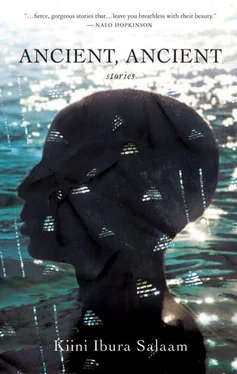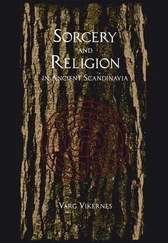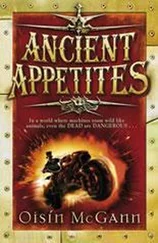In every room she sees nothing but unrecognizable pieces of black. Then she reaches the back of the house. There she finds the only intact door inside the destroyed home. She turns the doorknob, and the door swings open with surprising ease. Two mice scurry out of the room, racing over her feet and disappearing into the ruins. She opens the door wider, and a bird swoops out. The bird is followed by a river of roaches streaming past WaLiLa’s legs. After the roach exodus is complete, she pauses, waiting for more creatures to flee. When none do, she enters the room.
The room’s air is cool, and it rolls over her silently. She senses that this is Elisa’s room—not her bedroom, but her prayer room. Above, a low white ceiling hangs solid and certain. The walls are plastered with scraps of paper filled with the markings of human speech. The floor is covered with mounds of objects. Each mound is a strange collection of items organized by a theme unknown to WaLiLa.
WaLiLa stoops to the ground and looks around. The mound directly in front of her consists of a jar of honey, an orange silk butterfly, a necklace of yellow flowers, old gold coins, and a pile of five oranges. The pile to her right has blue ribbons, three crystal glasses of water, silver rings, a doll in a frilly blue dress, a miniature ship with many sails, and a lace doily. The room bursts with ceramics, keepsakes, fruit, flour, flowers, water, wine, money, metal, nuts, coins, beads, shells, silk.
She leans back on her haunches as she takes in all the items that surround her. She focuses on a photograph of a smiling, young-looking Elisa holding hands with a beaming, sienna-colored man. Written on the back is “La Habana, 1973.” Next to it, under a crystal glass of water, rests another photograph of the same man. He stands knee-deep in the sea, his left hand resting on the corner of a handmade raft, the right one lifted in a melancholy salute. Written on the back is “Para Miami, May 1985.” Behind the glass of water, a small bundle wrapped in white silk waits. WaLiLa picks it up and hears the soft clink of metal. She gently unwraps it and discovers two plain rings. Inscribed inside the rings is the phrase “Elisa y Gigaldo, para siempre.”
WaLiLa reties the bundle and puts it back behind the glass of water. She stands and carefully steps to the center of the room. She takes a deep breath, and the unmistakable scent of fuel sinks into her body. Suddenly conscious of the energy pulsating through the items in the room, her hands begin to tremble. Not a flower has been singed, nor a fruit shriveled. She looks around and realizes most of the mounds are adorned with fresh flowers. One petal from each pile , her message-center calculates , will keep you fueled for the remainder of this trip . She tiptoes around the piles, plucking one petal from each altar and shoving them into the pocket of her dress.
When the collecting is done, WaLiLa listens to the noises in the rest of the house. She hears the muffled sound of things being moved around. Certain of her solitude, she lifts the hem of her dress and tucks it into the dress’s neckline. She presses two rose petals against the center of her torso and closes her eyes as her body accepts the fuel. Her practiced fingers feel nothing amiss. Neither her fingers nor her message-center consider that these petals stubbornly survived the threat of fire only by filling themselves with smoke.
4.
WaLiLa sits at a round table nestled under the stairs with a belly full of mango batida and egg sandwich. The table, the stairs, and the apartment belong to Liliana, Elisa’s sister-in-law. On the night of the fire, Liliana guided the dispossessed family to her home. She filled them with hot chocolate, wrapped them in sheets, and insisted that they sleep. Elisa sits at the table across from WaLiLa. She stares vacantly at the wall. Since the fire, Elisa has locked herself into a silent state of mourning. She eats when Liliana places food in front of her. She bathes when Liliana fills a bath bucket for her. She only leaves the house when Liliana insists. Prayer is the only activity Elisa does unasked. The majority of her hours are spent staring into space, entertaining visions her mind creates and thoughts no one else has access to.
“Buenas!” Elisa’s former neighbor Silvia enters the open doorway ushering in the morning. Her soft, yucca-colored body is thinly covered with sweat. She sits down uninvited and asks for a cup of coffee. She runs one hand through her short curly hair, while she holds up a tattered envelope with the other.
“M’ija, this arrived for you yesterday afternoon. Papo brought it. His cousin had a visitor from Spain who carried it in his suitcase.” Silvia places the envelope onto Elisa’s lap with ritualistic flair and breaks into a self-mocking laugh. “Que triste! How sad it is that the mail travels more than we do.”
As Silvia presses her lips to the rim of the coffee cup, Elisa opens the letter. Silvia launches into an extended lament of exhaustion. Her bicycle is broken, she had to borrow her son’s, it is so hard to use a bicycle for transportation, maybe not for the children because they never had a vehicle, but wow, how she misses the old family car, and oh, what a hard life.
“What is it, m’ija?” Silvia interrupts her tirade to ask of Elisa’s contorted face.
Elisa looks up from the letter.
“My mother-in-law, she’s ill, she needs me in Spain.”
Liliana grabs the letter from Elisa and peers at her mother’s shaky scrawls. By the time she reaches the end of the letter, she is crying.
“She didn’t want us to know,” Liliana says to no one in particular.
Elisa stands and rests her arm around Liliana’s shoulder. A departure from Cuba’s arms is the last thing Elisa desires, but she’s the only one who can go. Liliana couldn’t get out of the country in a million years. Nor could any of Liliana’s brothers and sisters. Elisa, with her income and status, is the only one who can fly to her mother-in-law’s aid.
“Aiiii, mi niña,” Silvia complains, “if we were in any other country! Your poor mother may die before you get a ticket in this maldito country.”
Elisa shushes Silvia with a few clucks of her tongue.
“Don’t you worry, Lili. I’ll go get Mami, and I’ll bring her home.”
“Of course, of course,” Silvia coos. “I’ll help too. I have a cousin in the visa department. We’ll get the papers you need.”
“I appreciate it, vieja,” Liliana sighs. “I’ll go to Señor Alberto and Señora Franco to get the money Papi left with them. It’ll take me two days. You think your cousin can help us then?”
“Sí, I’ll go talk to him now,” Silvia says.
“I’m coming with you,” Elisa says and goes upstairs to collect her purse. Before she leaves, she wakes her sons and tells them what has happened.
“Liliana’s going to the country to get money from our relatives. I’ll be too busy running after visa papers to look after our guest. Watch over her, m’ijos. Make sure she has everything she needs. And…” Elisa adds to the list of commands, “ask no questions of her.”
5.
The minute Elisa, Silvia, and Liliana walk out of the door, WaLiLa feels relentless questions whirling around her. These questions do not pass through the brothers’ lips. Fulfilling their mother’s request, they maintain a painful silence. Throughout the days, questions drop from their suspicious glances and take root in the air, like seeds in fertile soil. Left unasked, the questions blossom and grow. As afternoons pass, the questions learn to walk. They wander around the house following WaLiLa with their eyes. Soon, they sit across from her at the table peering at her as she eats. Eventually, WaLiLa bursts out with answers.
Читать дальше












